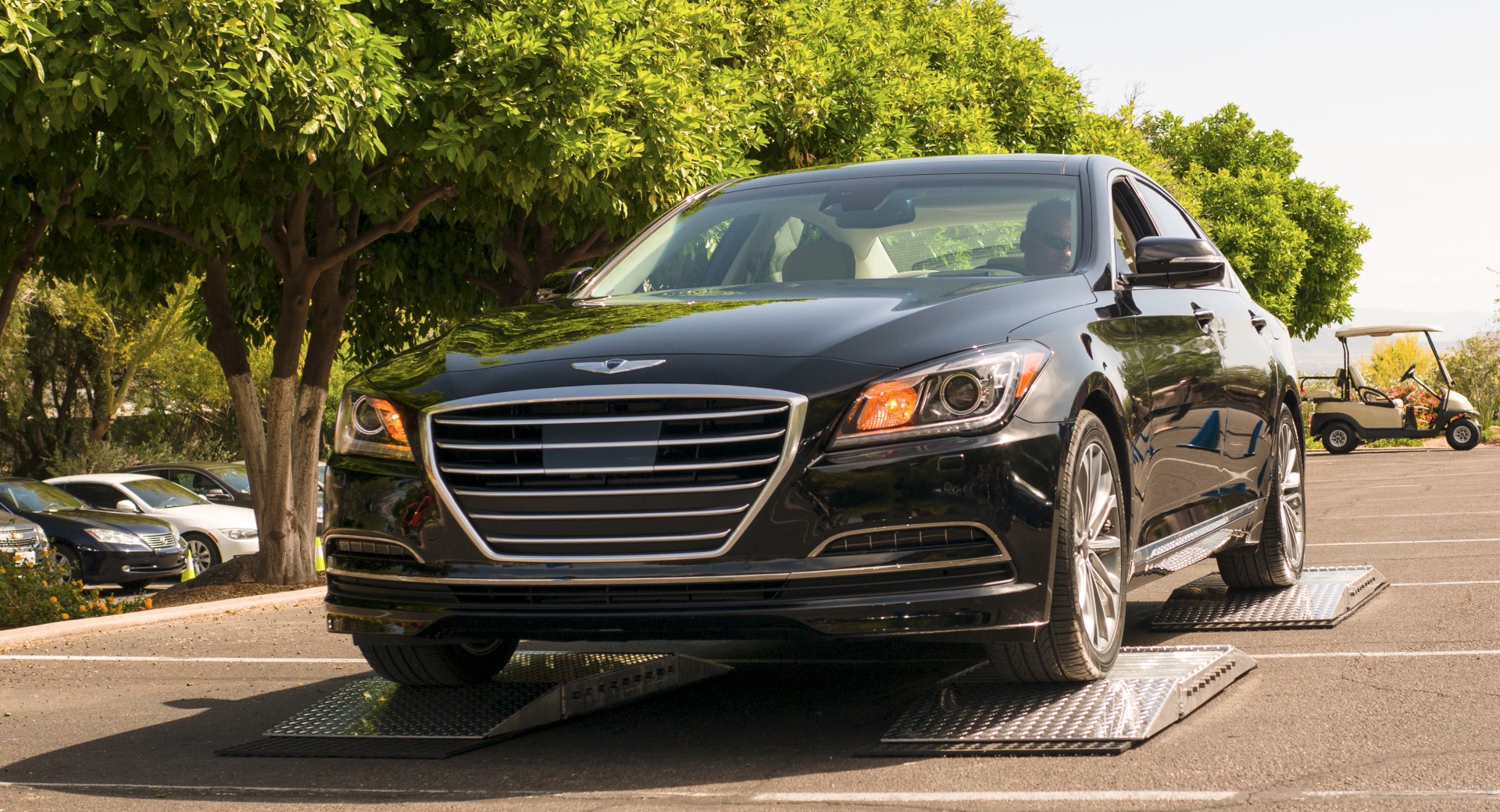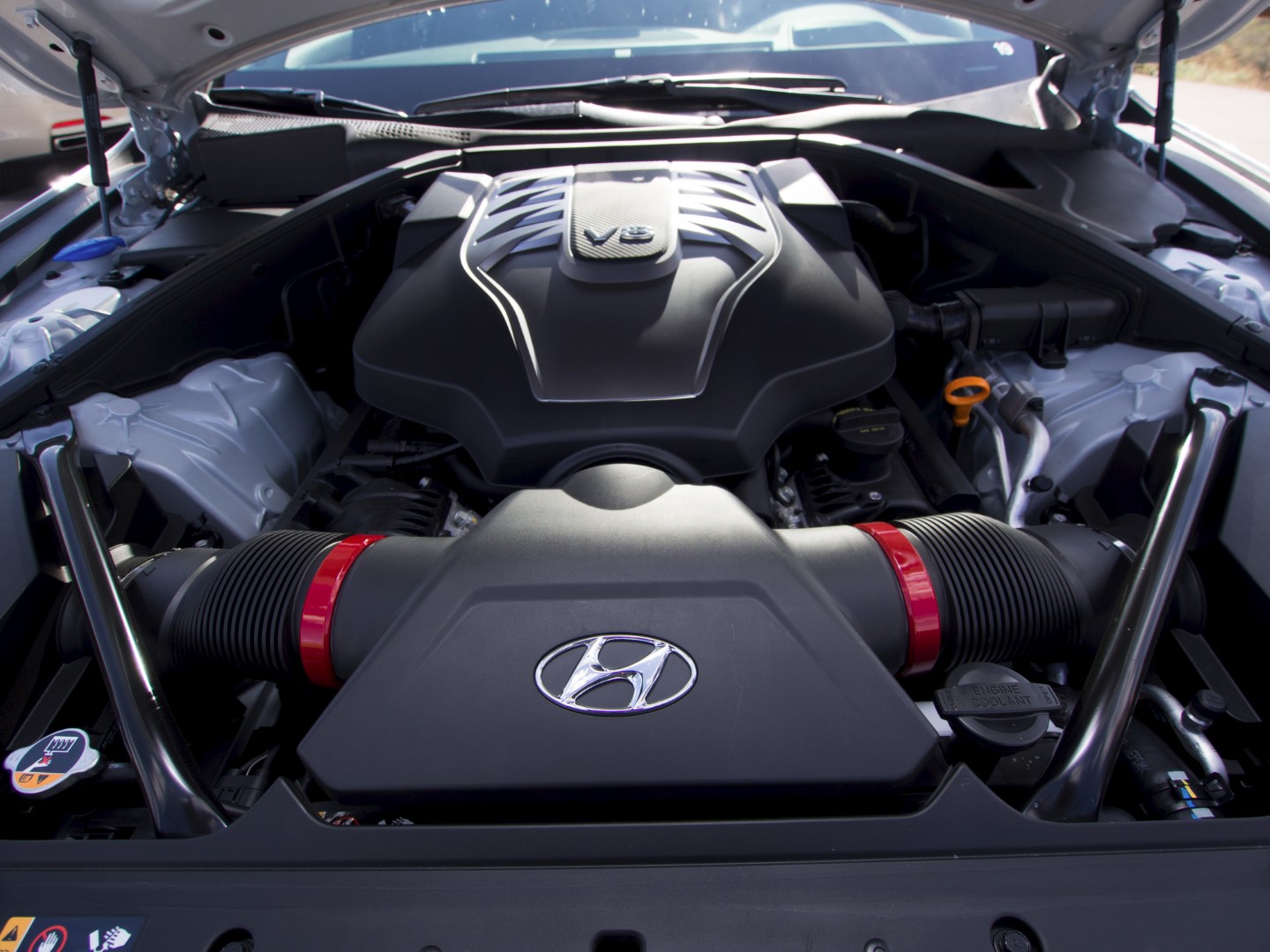2015 Hyundai Genesis Sedan: Android, Atom, And More
Hyundai is updating its luxury sedan with a new platform and design for 2015. We flew out to Arizona for a first drive of the 2015 Genesis.
Two Smooth Powertrains
Powertrains for the 2015 Genesis sedan remain the same as the previous generation. The 3.8-liter Lambda V6 returns as the base engine with different ECU tuning. While the previous generation Genesis sedan made 333 HP and 291 lb-ft, the second generation is down to 311 HP and 293 lb-ft. However, don’t let the numbers deceive you, the new Genesis makes peak torque at an earlier 5,000 RPM instead of 5,100 RPM and peak horsepower at 6,000 RPM versus 6,400 RPM. Hyundai’s tuning for low-end grunt of the 2015 Genesis helps move the 4,138lb heft smoothly.
New to the 2015 Genesis is the availability of AWD, which Hyundai calls HTRAC. The system enables Hyundai to appeal to buyers living in areas with heavy seasonal snow. HTRAC can send up to 90 percent of engine torque to the rear wheels. AWD power distribution also changes with the selected drive mode as well, with the Sport setting having more rear bias for greater driving enjoyment. Adding AWD only increases the curb weight by 165 lbs, which isn’t too bad if you need it for your winter commute. Opting for AWD also adds exclusive features such as heated rear seats, heated steering wheel, and headlamp washers to make cold winters more bearable for the driver and family.
Performance-minded drivers can go for the 5.0-liter Tau V8, which is carried over from the previous generation. Hyundai gives the Tau V8 different tuning to deliver more torque at the sacrifice of peak horsepower to reach 383 lb-ft and 420 HP.
Both powertrains are mated with Hyundai’s in-house designed 8-speed automatic. The final drive ratios are different for the differing amounts of power, but as with the Equus, the transmission is quite good with quick and smooth shifts. For those who prefer to shift yourself, paddle shifters are standard on all 2015 Genesis sedans.
Unlike the previous generation, where you could only get every option with the V8, the new Genesis lets buyers have the same equipment on V6 and V8 models. So for those who want the Ultimate Package features but not the fuel economy hit of the V8, Hyundai will let you have it your way.
Speaking of fuel economy, the V6 RWD Genesis sedan is rated for 18/29/22MPG for city/highway/combined, while adding AWD drops the rating down to 16/25/19MPG. V8 buyers should see 15/23/18MPG, which is typical of gas guzzling V8s.
So at this point you’re probably wondering how it drives. We’re happy to report that at legal speed limits without too much speeding, it drives well. Hyundai has done a great job keeping NVH (noise, vibration, harshness) down for a quiet cabin. Steering and road feel are also excellent, you feel connected, and the car responds very well. The Lotus-tuned suspension is excellent and aggressively tackled the windy roads competently.
Get Tom's Hardware's best news and in-depth reviews, straight to your inbox.
As for the V6 versus the V8, we enjoyed the smoothness and power of the bigger motor, but it wasn’t a compelling sell for us. Despite having more power, the V8 adds an extra 403lbs, which you can definitely feel on the road. It’s not as spritely as the V6, nor does the throttle respond as well. We noticed a little delay in the throttle response in the V8 that wasn’t present in the V6. The V6 Genesis sedan is perfectly capable at moving the vehicle’s 4,138lb heft smoothly. It’s a smooth motor, but it's still able to gently throw you back in your seat when you punch the gas.
Overall, it’s a car that rides comfortably, responds well, and delivers power smoothly. Sure, you could probably criticize its performance around the track, but luxury car buyers rarely, if ever, take their cars on the track. As a daily driver, the Genesis sedan will surely please.
Current page: Two Smooth Powertrains
Prev Page Driver Assistance, HUD, Hands-free Trunk and CO2 Sensor Next Page A Solid Luxury Vehicle The Competition Should Fear-
s3anister I can't be the only one that gets disappointed when a new article is posted and it turns out to be a car...Reply -
danwat1234 They should make a hybrid version with a powerful electric motor to boost acceleration and to regen with and start/stop the engine with.Reply -
blackmagnum I can't get over to being interested in a product that is a hobo's Bentley wannabe. Thanks A.T.H.Reply -
JOSHSKORN <yawn> Call me when they start making cars that run on photosynthesis, so we can do away with gasoline and make Al Gore shut up about Global Warming.Reply -
Flicules I have become a little dissapointed lately with you guys covering only spaceships instead of more down-to-earth cars(price wise). I really doubt that a guy who affords an A8, a Bentley or this Hyundai really bothers to check reviews on the internet...It's nice to get a taste of the future...but a balanced mix would be better i think. Feels a bit like Top Gear :DReply -
Avro Arrow Strange car. Looks like an Aston Martin from the front and a Hyundai Elantra from the rear. One big mistake they made is they really overdid that fake wood paneling. That "wood dashboard" is hideous. It looks like it belongs in a Jeep Wagoneer.Reply -
tuanies Reply13045675 said:They should make a hybrid version with a powerful electric motor to boost acceleration and to regen with and start/stop the engine with.
The problem with Hybrids on big vehicles is there's very little benefit. The next review will be of the Lexus LS600hL and the fuel economy is only about 2MPG better in the city but 1MPG worse on the highway, at the cost of 2 Equus'.
13045840 said:I can't get over to being interested in a product that is a hobo's Bentley wannabe. Thanks A.T.H.
Judging by that, anything in that $50k range is a hobo's Bentley.
13046439 said:I have become a little dissapointed lately with you guys covering only spaceships instead of more down-to-earth cars(price wise). I really doubt that a guy who affords an A8, a Bentley or this Hyundai really bothers to check reviews on the internet...It's nice to get a taste of the future...but a balanced mix would be better i think. Feels a bit like Top Gear :D
Interestingly enough, the GT-R, A8L, Equus and Bentley are the stories where there was someone that chimed in saying they owned one. But that's where there's all the advanced in-car tech. While I have come across lesser cars, there's not enough tech or new features from another model for a complete story. I do plan on having a quick story on the new WRX/STI, Fiesta ST, and eventually Mazda3. However, I believe the next round of updates to compact and subcompact cars should bring new tech that will be worth covering. We're working with vehicles on a 5-year development cycle so what was new 5-years ago is what shows up for production.
We will also start a project car series as well with my new 2014 Mazda5 Sport 6MT that I'm working to upgrade with whatever bits of tech I can get my hands on from the aftermarket.
13047022 said:Strange car. Looks like an Aston Martin from the front and a Hyundai Elantra from the rear. One big mistake they made is they really overdid that fake wood paneling. That "wood dashboard" is hideous. It looks like it belongs in a Jeep Wagoneer.
That wood paneling is actually real matte wood. Its porous and treated. -
ubercake There's high-tech gadgetry going on all over this vehicle, but I always find it funny when auto companies throw in an analog clock to take up some space on the center console (in addition to the digital clock up in the main display). I guess if you never learned to read a digital clock you can always fall back on your analog clock reading skills? Personally, I'd prefer some iteration of a sundial in place of an analog clock.Reply -
BranFlake5 Nope! This is not a luxury car of my taste. I'd buy an Audi A4 Quattro before even considering this thing. Heck, I'd buy a Tesla for a bit more.Reply -
g-unit1111 Reply13047884 said:There's high-tech gadgetry going on all over this vehicle, but I always find it funny when auto companies throw in an analog clock to take up some space on the center console (in addition to the digital clock up in the main display). I guess if you never learned to read a digital clock you can always fall back on your analog clock reading skills? Personally, I'd prefer some iteration of a sundial in place of an analog clock.
Yeah I've always thought that's kind of random too. Let's put the highest tech you can possibly imagine in a car, charge $50K for it, then it's put a 10 cent time piece in the center of the dashboard. :lol:

